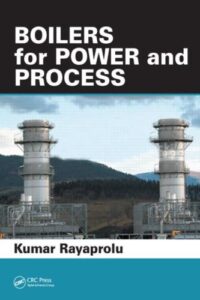Boilers for Power and Process
Boilers for Power and Process
Boilers for Power and Process on water tube boilers for practicing engineers and a reference book for students of heat and power. Let me hasten to dispel a possible interpretation of a “practical book” as a book dealing with only nuts and bolts. On the contrary, this book delves into the theoretical aspects required for a practicing boiler engineer. It tries to recapitulate and build on the forgotten fundamentals of a busy power engineer, providing a higher level of understanding and a wider exposure to various modern boiler and firing technologies.
You can also read Boilers A Practical Reference
There is a lot of design data provided in this book through charts, graphs, guidelines, and comparisons, which needed by a reader. To make referencing easy, such data collated and presented as lists of references and useful data in the front matter and
appendices that definitely add to the utility of this book for beginners as well as the experienced. They are
- A set of frequently needed process calculations of a boiler
- Glossary providing ready definitions to a number of commonly used (or misused) boiler terms
Boilers for Power and Process written with the following people in mind:![Boilers for Power and Process Boilers for Power and Process]()
- Consultants who require a broad perspective and a peripheral, but accurate, understanding to be able to specify and engineer a boiler plant, both at bid and detailed engineering stages
- Boiler designers who need to deepen their understanding of the fundamentals and construction features
- Operating engineers who need to know the why and how facts about various boilers that they encounter
- Project execution professionals who need to know both the macro and micro details of boiler plants
- Graduates and postgraduate students opting for courses in heat power or boiler technology who need practical inputs
In fact, this book should be of interest to any engineer in the field of power who wants to know more about contemporary boilers. Engineers in lower and middle management levels and who still must battle with technicalities and management issues should find this volume particularly interesting and directly useful.


Comments are closed.